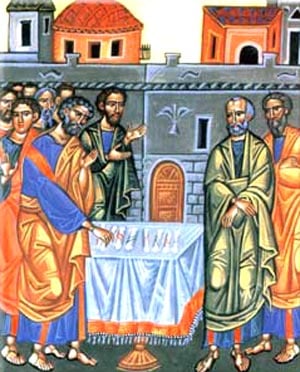Meanwhile, His will prevails, which is part of the reason why I don’t spend much time worrying about the sanctity of voting.
Oh sure, I’ve explained how the First Past the Post system works here in the U.S., and I’ve said I get a healthy bit of advice from Chesterton’s Democracy of the Dead. I even said I’ll be voting for Romney, long before the polls made a victory look feasible.
But all this angst about voting, and it’s purported effect on my immortal soul, etc? Balderdash.
And do you know why this anxiety is balderdash? Because you’ve forgotten the hand of God in the election process. Oh, yes you have! Because you think elections are all about you.
Was it all about you when the Apostles had to replace Judas? Did they use the Roman democratic model in place at the time and give every apostle an equal vote? Nope. They basically drew straws and trusted the result to God.
So they proposed two, Joseph called Barsabbas, who was also known as Justus, and Matthias. Then they prayed, “You, Lord, who know the hearts of all, show which one of these two you have chosen to take the place in this apostolic ministry from which Judas turned away to go to his own place.” Then they gave lots to them, and the lot fell upon Matthias, and he was counted with the eleven apostles.
Two?! Why only two? Did the lesser of two evils win that contest, I wonder?
Which brings me to that shibboleth of a phrase as well. Do you honestly believe that God does not work at all through the political parties, or the process to choose candidates? I’m not saying that parties are a replacement for the Church, but what with 1 in 5 folks being unchurched nowadays, the “churched” need to be involved in the process.
These days, I hear lots of wailing and gnashing of teeth about the sorry state of our political parties evidenced by their picking of these two nabobs we have to choose from. I’m not sure who first had the bright idea of the notion of choosing “the lesser of two evils” (when we have a choice), but I do know that my old friend (and mentor) Thomas à Kempis brought it up in his book The Imitation of Christ.
It’s right there in the 12th chapter of Book III, which is titled On Inward Consolation (irony alert). Chapter 12 is laudably titled, Of the Inward Growth of Patience, and of the Struggle against Evil Desires. It’s a conversation between “the Disciple” and Christ, and it starts off with the disciple wisely saying,
PATIENCE, O Lord God, is very necessary for me, I see, because there are many adversities in this life. No matter what plans I make for my own peace, my life cannot be free from struggle and sorrow.
Thomas, in his Christ voice, replies in a way that kills two birds with one stone,
My child, you are right, yet My wish is not that you seek that peace which is free from temptations or meets with no opposition, but rather that you consider yourself as having found peace when you have been tormented with many tribulations and tried with many adversities.
If you say that you cannot suffer much, how will you endure the fire of purgatory? Of two evils, the lesser is always to be chosen. Therefore, in order that you may escape the everlasting punishments to come, try to bear present evils patiently for the sake of God.
You don’t say.
It turns out that Thomas may have borrowed this turn of phrase from Geoffrey Chaucer. It shows up in line 470, Book II of his poem Troilus and Criseyde. What’s my favorite endorsement of Chaucer’s, you ask? These, of course.
But to get back to the point, most of us these days aren’t involved in the candidate selection process at all, so we just throw stones, and bitch and moan about (seemingly) self-evident truths, while contemplating using our votes for doomed, quixotic, unvetted and unknown, candidates (or write-ins) and hope that sends a message to the uncaring supercomputer compiling the results somewhere.
Perhaps we should remember how Mattias was chosen instead. I’ve said before that I’m not sure why God deigned to give us popular sovereignty these days, but he has. But I can bet that the Almighty didn’t mean for us to twist ourselves into knots over it. That’s an example of man thinking as man, and not as God, as Qoheleth sagely noted when he wrote,
“God made man simple, but he gets lost in his many thoughts.”
Have we forgotten how to pray and how to trust in God? So it seems. Here’s a better idea.
Pray.Think.Vote. Move on.
Then, continue to pray as you maintain some inward consolation.
UPDATE:
Rebecca Hamilton shares a voter’s guide on religious freedom.
John Zmirak (author of The Bad Catholic’s Guide series) has thoughts on voting too.
 Content Director’s Note: This post is a part of our Election Month at Patheos feature. Patheos was designed to present the world’s most compelling conversations on life’s most important questions. Please join the Facebook following for our new News and Politics Channel — and check back throughout the month for more commentary on Election 2012. Please use hashtag #PatheosElection on Twitter.
Content Director’s Note: This post is a part of our Election Month at Patheos feature. Patheos was designed to present the world’s most compelling conversations on life’s most important questions. Please join the Facebook following for our new News and Politics Channel — and check back throughout the month for more commentary on Election 2012. Please use hashtag #PatheosElection on Twitter.












